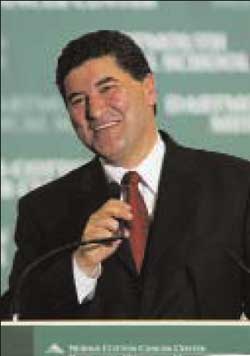Vital Signs:
National commentators
tackle the topic of
"transforming medicine"
How to accelerate the transformation of scientific discoveries into medical treatments was the subject of a recent DHMC forum called "Transforming Medicine." The event was moderated by Susan Dentzer, health correspondent on the PBS NewsHour; she is a 1977 graduate of Dartmouth College and the chair of Dartmouth's Board of Trustees.
 Photo by Mark Austin-Washburn |
| NIH Director Elias Zerhouni feels communication about clinical trials is key. |
The panelists included Elias Zerhouni, M.D., director of the National Institutes of Health (NIH); Andrew von Eschenbach, M.D., director of the National Cancer Institute (NCI); Mark Israel, M.D., director of Dartmouth's Norris Cotton Cancer Center; Peter Corr, Ph.D., senior vice president of Pfizer; DMS researchers Nancy Speck, Ph.D., and Allen Dietrich, M.D.; and Nancy Hellman, Ed.D., an administrator at Smith College and a cancer survivor.
Also at the event were U.S. Senator Judd Gregg of New Hampshire, chair of the Senate Health, Education, Labor, and Pensions Committee; Marlene Malek, president of the national Friends of Cancer Research; and Mary Wooley, president of Research! America. Gregg accepted an award from those organizations for his commitment to medical research.
As Dentzer directed questions to the various panelists, a picture of the challenges facing medicine began to emerge. "We need to find a different way of organizing scientific teams" along interdisciplinary lines, said Zerhouni, and "we need to have a better system of clinical investigations." In fact, all the panelists agreed on the importance of improving the clinical trials system so more patients have access to the newest treatments.
Cancer survivor Hellman spoke of the difficulty patients have even finding clinical trials. After she was diagnosed with metastatic melanoma, she was referred to a Norris Cotton physician who enrolled her in a clinical trial combining highdose Interleukin-2 with a tumor vaccine. Still, she said it was scary and frustrating to have to do so much of the research about clinical trials on her own.
Basic: Von Eschenbach described an NCI initiative that's a step in the right direction: the Cancer Bioinformatics Grid (CABIG), which will allow cancer centers to integrate and share data on basic and translational studies and clinical trials. "The Norris Cotton Cancer Center has been one of the lead institutes in helping with the development of CABIG," he said.
Zerhouni mentioned an NIH project also aimed at the sharing of clinical trials information: the National Electronic Clinical Trial and Research Network (NECTAR). Often, even cancer centers can't communicate effectively with one another because there is no common language. "Medical data is actually using seven different dictionaries in our country to be put into computers," he explained. "You can't even correlate what happens in one region versus another." Another NIH initiative is the Clinical Research Associates Corporation, which is training physicians to educate the public about clinical trials.
Dentzer asked questions that got the panelists talking about better collaboration among basic scientists and clinicians.
"Many of us are very intimately and deeply involved in our own research projects, and not necessarily looking beyond that to what the clinical applications might be," Speck pointed out. "One of the important things to do, and it's something we try to do here all the time, is to constantly help people form relationships-scientists and clinicians." She urged the NCI or NIH to find a way to catalyze such collaborations.
Head-scratcher: "When a member of the public hears this, in my experience it's kind of a 'headscratcher,' " responded Dentzer. "They say, 'Wait a minute- you're working in your lab on something that's supposed to help patients, and he's over in the clinic doing something that's supposed to help patients, and you don't talk to each other?'"
"Well, a lot of times the findings from basic science that really impact in clinical medicine are not necessarily so obvious at the beginning," Speck replied. Israel added that at Norris Cotton, programs are codirected by researcher-clinician teams with "the singular goal . . . [being] to translate."
Dentzer also asked probing questions about barriers keeping government and academic researchers from working collaboratively with industry.
Corr tackled that one first. "I think fundamentally there has to be a trust element in each of the components," he said, "that you have to work together and you have to start very early in the process." Then things "can proceed very well," although, he cautioned, "we need to get the legal constraints out of the way, or at least confine them."
Zerhouni also addressed the issue of public-private partnerships. "My experience is that there is a lot of distrust, actually, of government using government resources to enrich private industry," he said. "Yet, at the same time, people say, 'Well, how are you going to make these things happen without private industry?' So, it's a little bit schizophrenic in many ways."
DMS Dean Stephen Spielberg, M.D., Ph.D., summed up the challenge: "The bottom line," he said, "is that by working together-community, government, industry, health-care profession-we really can, in fact, transform medicine."
Laura Stephenson Carter
If you would like to offer any feedback about this article, we would welcome getting your comments at DartMed@Dartmouth.edu.
